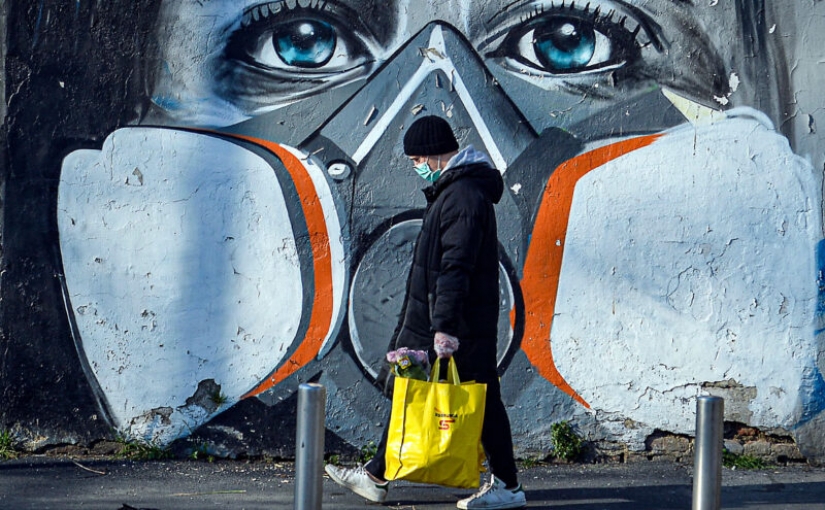Why everything is so bad in risk assessment: 5 cognitive distortions of the human brain on the example of the coronavirus
Categories: Health and Medicine | Science | World
By Pictolic https://pictolic.com/article/why-everything-is-so-bad-in-risk-assessment-5-cognitive-distortions-of-the-human-brain-on-the-example-of-the-coronavirus.htmlAt the moment, in many regions of Russia, only vague memories remain of quarantine measures. In most cities, people calmly walk along the streets, shopping centers, visit restaurants and other public places.
 Many people have not worn masks for a long time and have forgotten about maintaining social distance, but the pandemic has not gone away.
Many people have not worn masks for a long time and have forgotten about maintaining social distance, but the pandemic has not gone away.

Moreover, the World Health Organization records record levels of coronavirus infection in the world almost every day, which indicates an increase in the pandemic at the global level. In Russia, according to official statistics alone, more than 6,000 cases of infection are recorded every day, and each of us has every chance to get sick with this insidious new type of pneumonia, for which there is still no effective cure.
So where and why has the fear of a deadly virus disappeared? Below are 5 cognitive distortions that explain why most people are not too good at assessing risks.

Our brain can sometimes be too optimistic. And although this is not always a bad thing (constantly thinking about bad things and expecting something terrible to happen to you or your loved ones is not healthy), sometimes our brain can put us at unnecessary risk.
The cognitive distortion caused by unrealistic optimism (optimism bias) causes a person to constantly overestimate the probability of a positive outcome.
This confidence in a positive outcome often makes us ignore research, logic, common sense, scientists, warnings from doctors and relatives. Admit it, you go out without a mask precisely because you are sure that everything will be fine, and the coronavirus is not your concern. Unfortunately, this is not the case.

It's about the tendency of the human brain to overestimate the degree to which you are in control of the situation. A very common cognitive distortion that is difficult to deal with.
We believe that everything is fine, because everything (or almost everything) is under our control. Even when it comes to events and circumstances that objectively depend on us to a lesser extent.
Thus, a person can convince himself that going to a small store is less dangerous than going to a large shopping center. However, in fact, you can get infected with coronavirus both there and there. Especially if you go to these places without a mask.

As a rule, we learn about the danger of anything in the same way: by coming across the same information several times from different sources.
Take, for example, smoking. Most likely, you learned that it causes cancer in childhood, from your parents. Then they told you about it at school, and after that you yourself saw a lot of programs on TV and articles on the Internet on this topic.
Due to the information chaos, the coronavirus seems to be an "ambiguous" problem, despite the fact that thousands of people die from it every day around the world.

This type of cognitive distortion and systematic error of inductive thinking is characterized by a person's tendency to find and give preference to information that is consistent with his point of view, belief or hypothesis. That is why it is called a biased confirmation of one's point of view (confirmation bias).
People tend to interpret ambiguous evidence in a way that supports their point of view. The effect is stronger in relation to emotionally significant issues and deeply rooted beliefs.
A curious example of this distortion was given by Marie Helweg-Larsen, a professor of psychology at Dickinson College. Most likely, if you are wondering if it is possible to go on a picnic with friends in the park, you will Google "is it safe to eat outside during the coronavirus". So the search engine will show articles telling why it is safe to eat on the street during the pandemic.

Exposure therapy is a type of behavioral therapy used to treat various types of anxiety disorders and phobias. It includes intentional regular portion exposure to the patient by a source of anxiety in a controlled safe situation.
For example, if a person is afraid of dogs, safe interaction with them in small quantities can help him. For example, a psychotherapist abroad may offer a patient to work part-time in a pet store. Being in a state of permanent anxiety is dangerous for health, so our brain is trying to create a kind of safety cushion: we are gradually getting used to the coronavirus pandemic and treat it as a given.
In certain situations, the protective mechanism of our psyche can save our lives, but in others, alas, the opposite is true. Underestimating the risks and the scale of the problem, we neglect the most important thing — precautions.
Do not visit public places unless absolutely necessary (clubs, bars and restaurants are not an extreme necessity). Be sure to wear a mask. Wash your hands with soap every hour and do not touch your face with them. Try to distance yourself from people and communicate more online.
Don't let the cognitive distortions of our brain tip the scales in favor of risky behavior.
Keywords: Coronavirus | Brain | Deception | Psychology
Post News ArticleRecent articles

Straws are such a commonplace item that we rarely think about their origins. It seems they've always been around: in cocktails, ...

In the Victorian era Britain was quickly urbanized. By 1851 it became the first country lived in cities of more people than in the ...
Related articles

There are people who all his life selflessly and work hard, but never have time to enjoy financial independence. And there are ...

Looks can be deceiving not only in humans, but some items, the real purpose of which is failing. At first glance, this fragrant ...

The traditional story of the American Civil War is revenge by historical accounts, told on behalf of men who fought as Yankees or ...

Every day we face some trouble. The technique is slow, when you need something rushed, all traffic lights you come across on the ...